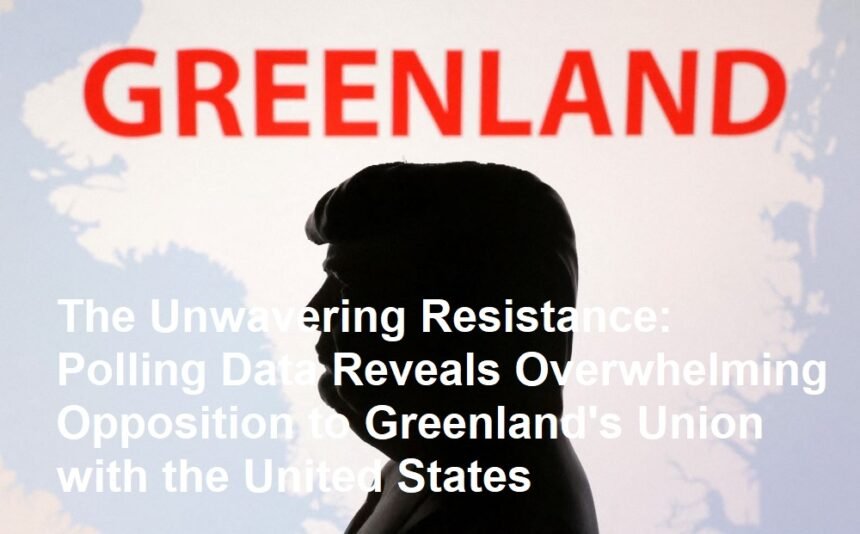The possibility of Greenland’s integration into the United States, a proposition that has intermittently surfaced in political discourse, faces a formidable obstacle: the resolute will of the Greenlandic people. A recent poll conducted by Verian, a prominent surveying institution, underscores this reality, revealing that a staggering 85 percent of Greenlandic voters are opposed to the idea of joining the American union. This overwhelming rejection, captured through rigorous polling methodologies, speaks volumes about Greenland’s deeply rooted identity, its geopolitical considerations, and the prevailing sentiment against relinquishing its established relationship with the Kingdom of Denmark.
The context surrounding this poll is crucial for understanding its significance. The United States, throughout history, has demonstrated a strategic interest in Greenland, primarily driven by its geographic location and access to natural resources. The most notable instance of this interest was the 1946 attempt by President Harry Truman to purchase Greenland from Denmark for $100 million. While this offer was declined, the historical precedent set a foundation for recurring discussions regarding a potential American acquisition or integration of the island nation. The underlying motivations remain consistent: bolstering strategic influence in the Arctic region, gaining access to untapped reserves of minerals and energy, and mitigating potential threats from rival global powers.
However, these ambitions collide with the self-determination of the Greenlandic people, a population acutely aware of their unique cultural heritage and political autonomy. Greenland, while technically an autonomous constituent country within the Kingdom of Denmark, possesses a significant degree of self-governance, including control over its natural resources and internal affairs. This hard-earned autonomy, secured through decades of political negotiation and evolving relationships with Denmark, is undoubtedly a treasured possession that the Greenlandic people are reluctant to relinquish.
The Verian poll data highlights several key factors contributing to this widespread opposition. Firstly, the preservation of Greenlandic identity is paramount. Greenland, with its distinct Inuit culture and language, possesses a societal fabric woven with traditions and values that are intrinsically linked to its geographic isolation and historical experiences. The assimilation into the United States, with its predominantly Western culture and established political system, is perceived as a threat to this cultural integrity. The fear of cultural homogenization, the potential erosion of the Greenlandic language, and the loss of unique cultural practices are significant drivers of resistance against American integration.
Secondly, the Greenlandic people are deeply conscious of their relationship with Denmark, a relationship that has evolved from colonial rule to a partnership based on mutual respect and cooperation. While challenges and disagreements undoubtedly exist, the prevailing sentiment leans towards maintaining this established relationship, albeit with continued efforts towards greater autonomy and self-determination. The economic and social benefits derived from this partnership, including access to Danish social welfare programs and trade opportunities within the European Union, are factors that weigh heavily against the uncertain prospects of joining the United States.
Thirdly, the potential impact of American integration on Greenland’s environmental policies is a major concern. The Arctic region is particularly vulnerable to climate change, and Greenland is already experiencing the tangible effects of rising temperatures, melting glaciers, and shifting ecosystems. There is a widespread apprehension that American environmental policies, often perceived as less stringent than those adopted by Greenland and Denmark, could exacerbate these environmental challenges and jeopardize the long-term sustainability of the island. The potential for increased resource extraction and industrial development under American control further fuels these environmental anxieties.
Furthermore, the question of sovereignty and self-determination lies at the heart of this opposition. The Greenlandic people have demonstrated a clear desire to chart their own course and exercise greater control over their future. Joining the United States, even with guarantees of autonomy, would inherently involve surrendering a degree of sovereignty and relinquishing control over key aspects of governance, including foreign policy and defense. This sacrifice of self-determination is viewed as a significant price to pay, particularly given the ongoing efforts towards achieving greater independence from Denmark.
The implications of the Verian poll extend beyond the immediate question of Greenland’s potential integration into the United States. It serves as a powerful reminder of the importance of respecting the self-determination of indigenous populations and the need for international cooperation in the face of global challenges, particularly in the Arctic region. The Greenlandic people have spoken resoundingly, and their voices must be heard and respected in any future discussions regarding the island’s future. The 85 percent opposition rate underscores the strength of their convictions and the unwavering commitment to preserving their unique identity and charting their own path forward in the Arctic landscape. The poll, therefore, acts as a crucial datapoint in the ongoing narrative of Greenland’s future, highlighting the undeniable power of popular opinion and the enduring desire for self-governance.
A recent poll conducted by the Verian survey institute reveals a stark reality regarding the potential integration of Greenland with the United States. According to the data, a significant majority, 85 percent of polled voters, vehemently reject the notion of Greenland joining the American union. This overwhelming opposition underscores the complex political, cultural, and economic considerations that would inevitably accompany such a proposition.
This high percentage of rejection likely stems from a multitude of factors. Greenland, an autonomous territory within the Kingdom of Denmark, possesses a distinct cultural identity deeply rooted in Inuit traditions and a long history of self-governance. Joining the United States would represent a fundamental shift in this identity and a potential erosion of Greenlandic sovereignty. Concerns regarding the potential impact on their language, cultural heritage, and overall way of life are undoubtedly central to this widespread reluctance.
Furthermore, the poll results likely reflect anxieties regarding the potential economic and social consequences of integration. While proponents might argue for increased economic opportunities and infrastructural development under American governance, opponents may fear the loss of control over Greenland’s natural resources, particularly as the Arctic region becomes increasingly strategically important. They might also anticipate the social challenges associated with a significant influx of American influence and the potential disruption to their existing social fabric.
The Verian poll data, therefore, provides a crucial insight into the sentiment within Greenland regarding its future relationship with the United States. While the American government has expressed interest in acquiring Greenland in the past, this overwhelming rejection by the Greenlandic populace presents a significant obstacle to any future attempts at annexation or integration. It highlights the importance of respecting the self-determination of Greenlanders and understanding the deep-seated concerns that underpin their firm stance against joining the United States. The future of Greenland, it seems, will be determined by its own people, resolutely preserving their unique identity and charting their own course.












